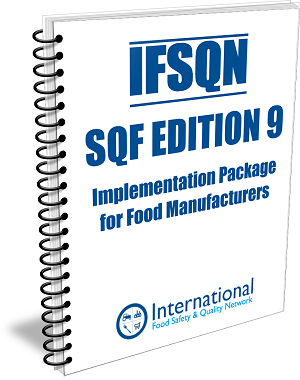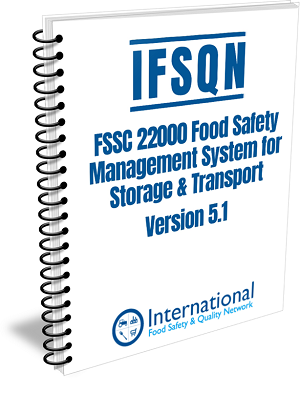- Home
- Sponsors
- Forums
- Members ˅
- Resources ˅
- Files
- FAQ ˅
- Jobs
-
Webinars ˅
- Upcoming Food Safety Fridays
- Recorded Food Safety Fridays
- Upcoming Hot Topics from Sponsors
- Recorded Hot Topics from Sponsors
- Food Safety Live 2013
- Food Safety Live 2014
- Food Safety Live 2015
- Food Safety Live 2016
- Food Safety Live 2017
- Food Safety Live 2018
- Food Safety Live 2019
- Food Safety Live 2020
- Food Safety Live 2021
- Training ˅
- Links
- Store ˅
- More
Advertisement
Featured Implementation Packages
-
SQF Implementation Package for Food Manufacturers - Edition 9 (2022 Update)
This comprehensive documentation package is available for immediate download and... more
-
FSSC 22000 Food Safety Management System for Storage & Transport - Version 5.1
This is our premiere package for Food Storage & Distribution Operations look... more
Building a Skilled and Capable Workforce in the Food Industry
Oct 20 2024 05:24 PM | Simon
food industry workforce skills development employee training food safety workforce capability industry standards skill enhancement continuous improvement talent management regulatory compliance
Overview
Despite widespread implementation of food safety programs and the continual tightening of food laws, food safety incidents and foodborne illnesses remain a significant global threat, with severe economic and reputational impacts. The root of this persistent issue may lie in the food industry's lack of genuine investment in employee training and development. All too often, profit takes precedence over people and safety, leading to superficial compliance rather than meaningful competence.
This article explores the essential elements of high-quality employee training programs that make a lasting impact and drive business growth. The Costa Coffee tragedy is a reminder of the dire consequences of inadequate training and the urgency needed to elevate food safety standards from mere box-ticking exercises to a culture of continuous improvement and excellence. This shared commitment to promoting best practices in food safety training and standards is why we came together as a team.
Introduction
Food safety training and education are critical strategies for enhancing leaders' and employees' behaviours, knowledge and attitudes to ensure consumers receive safe food. Yet, many food operations worldwide see training and development as little more than a necessary expense—an obligatory box ticked on a compliance checklist—rather than an invaluable investment. Consequently, the industry often relies on quick-fix solutions like generic online courses, which prioritise convenience and cost over quality. While these courses often prioritise convenience and cost over content quality, they typically offer only theoretical knowledge – the accuracy of information is often missing. They fail to engage or challenge, particularly for those who require a deeper, more comprehensive understanding to uphold high food safety standards.
The Real-World Gap:
The disconnect between theory and practice in many training programs is glaring. Employees might walk away with a fundamental understanding of food safety principles, yet lack the practical skills to apply this knowledge effectively in their workplace. This gap perpetuates a cycle where employees are ill-prepared to manage real-world food safety challenges, leading to recurring food safety incidents and foodborne illness. To truly bridge this gap, the food industry must embrace a new approach to training—one that emphasises the practical application of knowledge in real-world settings – the workplace.
Shifting the Mindset: From Compliance to Competence
To break the cycle of superficial compliance and truly protect consumers, the food industry must undergo a shift in mindset. Instead of focusing on minimal compliance, food businesses need to prioritise meaningful skills development that empowers employees to excel in their roles. The cost-saving allure of cheaper training solutions may seem appealing, but the long-term consequences—lost business, an array of legal issues and tarnished reputations—far outweigh these short-term gains.
Essential Components of Effective Training Programs
Designing impactful food safety training requires a thoughtful approach, that tailors solutions to the unique needs of the food business and its employees. Customisation is key to ensuring that training is relevant, practical, and capable of driving meaningful change in workplace practices.
A common pitfall is excluding employees from the decision-making process about their training. When training programs are imposed top-down, they often fail to address the unique challenges and needs of frontline employees. While there is a belief that learning is co-owned by course developers and business leaders, the voices of those on the frontline are frequently overlooked. This disconnect can lead to significant gaps in knowledge and skills, ultimately compromising food safety standards.
By involving employees, a food business can ensure the content is truly effective and tailored to address the specific challenges and needs of their operations, leading to better engagement and practical application. One important aspect of effective training is ongoing support for employees who need extra help. Not all employees learn at the same pace or possess the same level of prior knowledge, making additional resources, mentoring, or follow-up sessions vital to ensuring that everyone is fully equipped to perform their duties safely and effectively.
The industry must also account for the diverse backgrounds of its workforce. Language barriers can hinder the understanding and application of food safety procedures, particularly for employees who do not speak English as their first language. By offering multilingual options, visual aids, and hands-on demonstrations, training programs can significantly improve comprehension and retention, ensuring that all employees meet the required standards.
Meaningful Learning Leading to Behavioral Change
Achieving meaningful learning requires more than just exposing employees to information—it demands a tangible change in behaviour. This transformation is best accomplished through action learning, where employees practice new behaviours directly on the job, within the specific contexts where they will be applied. This hands-on approach fosters real progress, allowing employees to internalise and refine their skills in real-world scenarios.
The spacing effect, where learning is spread out over time, is also critical in reinforcing these behaviours. By practising new skills at regular intervals, employees are more likely to retain information and apply it consistently, leading to lasting behavioural change and stronger food safety practices.
Embedding Training into Daily Operations
For training to be truly effective, it must be incorporated into daily operations, rather than treated as a one-time event. When training is integrated into everyday activities, learning becomes an ongoing process, ensuring that employees continually apply and reinforce their knowledge. This approach enhances retention and performance but also strengthens alignment with business goals.
Frontline leaders play a pivotal role in embedding training into daily operations. Their open, positive and inclusive communication and leadership ensure that training is not just a formality, but a continuous, impactful process for both the individual employee and the business.
Ongoing Education and Continuous Improvement
Continuous education is vital for fostering ongoing improvement within any food business. Learning shouldn’t stop after the initial training session; it should be a dynamic, evolving process that keeps pace with the changing needs of the food business and its employees. Regular refreshers, updates, and new learning opportunities help employees stay current with best practices and emerging trends.
Incorporating the spacing effect into ongoing education ensures that knowledge is not only retained but deepened through repeated application. Action learning, where employees tackle real-world challenges as part of their learning process, drives continuous improvement by encouraging innovation and adaptability.
This approach creates a dynamic learning environment where employees are constantly growing and the food business is continually enhancing its food safety practices. Ultimately, this leads to a stronger, more resilient culture of safety and excellence.
A Learning Culture Drives Business Success
Research consistently shows a strong positive correlation between a robust learning culture and improved business outcomes. A business that prioritises continuous learning and development consistently achieves better performance, fosters greater innovation and witnesses first-hand higher levels of employee engagement. This is particularly crucial in the food industry, where the risks are high and the costs of inadequate training can be substantial.
A Success Story: From Struggle to Success
Consider the story of a mid-sized bakery chain struggling with food safety compliance. The management realised that their generic training wasn’t effective, especially with their diverse team, many of whom spoke English as a second language. The company decided to take a different approach.
They invested in a customised training program with multilingual materials, interactive workshops, and hands-on practice sessions. Employees were encouraged to ask questions and practice new skills in a supportive environment. The training also involved regular follow-up sessions to reinforce the learning.
The results were remarkable. Not only did food safety incidents decrease, but employee confidence in handling food safety tasks also improved. The bakery chain’s reputation for quality and safety grew, leading to increased customer trust and business growth. This success story highlights the impact that well-designed, inclusive training can have on a company’s bottom line and its commitment to safety.
Conclusion
Basic food safety videos and online courses may provide a starting point, but they fail to foster the significant improvements needed in improving food safety practices. Real progress requires a more nuanced, hands-on approach that seamlessly integrates knowledge with consistent practice and application in the workplace. This shift from compliance to true competence is essential in building a robust food safety culture.
By prioritising what truly drives behavioural change—practical application, continuous support, and the integration of learning into daily operations—food businesses can create an environment where food safety is not just a box to tick but a core value that permeates every aspect of the operation. This commitment to continuous improvement and excellence in food safety is vital for safeguarding public health, protecting business reputations, and ensuring the industry's long-term success. The extra investment in higher-quality training will not only pay for itself but also lay the foundation for a safer, more resilient future.
Authors
Andrew Thomson is the owner of Think ST Solutions, a food safety and training consultancy serving the broader food service sector. With a career spanning diverse and influential roles, Andrew brings a wealth of expertise to the broader food industry. His extensive background includes writing for prominent food industry media outlets in the United States and Australia, holding key positions in food regulation and policy, and spearheading quality assurance initiatives. A passionate educator, Andrew has also served as a board member for a not-for-profit community food service organisation and a member of the Australian Institute of Training and Development.
Dr Matthew Wilson is a senior lecturer in food and nutrition at the University of Adelaide. He has a strong background in research and supervision in food quality, preservation, and shelf life. He has extensive experience teaching at the university level and specialises in food regulations, microbiology and food processing technologies.
Vanessa Trower is the Director of Nexperk Learning, specialising in creating learning programs that drive positive change, culture, and performance. With over 15 years of experience in Learning and Development and a background in HR, she works across large organisations, franchise chains, and the work skill sectors. Recognised with the Dr Alastair Rylatt Award for L&D Professionals and Learning Provider of the Year.
- joelchenda likes this











0 Comments